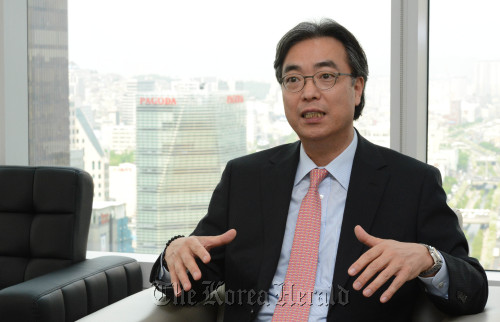The foundation offers a series of seminars, lectures and forums to promote exchanges of experts and opinion leaders on global and regional challenges. It also has been inviting the world’s prominent figures to its forum, including former U.S. President George W. Bush, Harvard’s Kennedy School of Government professor Joseph Nye, UNESCO director general Koichiro Matsuura and Colin Powell, former U.S. Secretary of State.
The organization will hold the KF Global Seminar in Washington next month on the Korea-U.S. alliance in partnership with the Brookings Institute. This is its first-ever academic seminar to be held overseas, Kim added. The foundation also plans to host new symposiums on public diplomacy in East Asia and global stage in July.
Global e-School
Global e-School is one of the foundation’s projects aimed at expanding “two-way” communication channel between Korea and middle power countries.
The Korea Foundation has been investing heavily to promote Korean studies to students, scholars and officials in major allies such as the United States, United Kingdom and France for many years, but not in emerging countries around the world, he said.
“To cost-effectively introduce general information on Korea including its history, culture as well as the country’s democratization process and economic development to those countries, the foundation will support universities to take part in the Global e-School project,” said Kim.
The project that started last year currently has 19 universities in 12 countries signed up. The foundation expects to increase the number of participating overseas universities to 57 in 23 countries and offer more than 120 Korea-related courses. About 2,400 students in and outside Korea are expected to attend e-classes this year. The Korea Foundation provides support for overall costs on curriculum development, lecture management and administration.
The Global e-Schools program combines real-time online video lectures on Korean studies with offline programs between universities in Korea and abroad. Online lectures are available on Korean politics, international relations, business, history, language and culture both in Korean and English.
For universities in different time zones, the foundation supports regional consortiums such as operating e-School programs between universities in the U.S. and Latin America. It has set up a consortium between the University of California Los Angeles and the National Autonomous University of Mexico, the College of Mexico and the National University of La Plata in Argentina.
This year, the foundation plans to provide e-lectures to universities in the Middle East in partnership with the Central European University in Hungary as the regions have only a two-hour time difference.
The popularity of the Global e-School project is higher than expected thanks to the Korean Wave. For instance, more than 500 students in the University of Charles in Prague applied for the program, far exceeding the capacity of 20 students.
“The project is aimed at offering a wide range of Korea-related courses to young students interested in Korea, thanks to hallyu and K-pop stars. It will foster young academics with expertise in Korean studies and also pro-Korea groups in the region,” he added.
Friends of Korea Foundation
Kim said he also wanted to build networks of pro-Korea groups in and outside the country, offering chances to connect to Korea on a continued basis.
“We really need to organize networking events so that those who are interested in Korea can really fall in love with the country,” he said.
The former ambassador to Australia plans to launch “Friends of Korea Foundation,” an online network among recipients of Korea Foundation scholarships or those who were invited to programs organized by the foundation in the last 21 years. The project also aims to list foreign diplomats and organizations stationed in Korea.
Starting with about 475 non-governmental diplomatic groups registered with the Foreign Ministry, Culture Ministry and Welfare Ministry, the foundation plans to launch the cyber networking project in June.
Calling it an incalculable diplomatic asset, Kim urged the government to support the project.
“We need to gather all scholars, officials and all those who received KF grants. The government should support the project because it requires money, time and human resources to draw the attention of those KF recipients around the world and get them to keep their eye on Korea,” he said.
Programs for foreign ambassadors in Korea will be also offered to systematically organize pro-Korea groups in the future, he added.
In November, the Korea Foundation will hold a week-long festival on Korean culture in Brazil to celebrate the 50th anniversary of diplomatic ties between Korea and some 20 Latin American countries. Titled “KF Festival in Brazil,” the foundation will bring Korean music, fashion, dance, movies and ceramics to the Latin American country from Nov. 5-12.
There will be also academic seminars, forums and lectures on Korean studies at local universities during the planned festival in Brazil, Kim said.
To promote mutual cultural exchanges, the foundation, in collaboration with the Ministry of Foreign Affairs, will hold a series of exhibitions on Latin American arts at its gallery located at the second floor of Center One Building on Euljiro in Seoul from May 15-29. It also plans to stage a number of performances by artists coming from six Latin American artists at the Hanbit Square, outside of the Center One Building May 26-29 and also at Theater Yong of the National Museum of Korea, central Seoul, from May 31 to June 3. Participating countries include Brazil, Colombia, Mexico and Argentina.
Kim Woo-sang
Kim, 53, is an academic who served as a political science professor at Sookmyung University and Yonsei University and director of the Institute of East & West Studies at Yonsei University.
He was a senior adviser on the presidential transition committee on foreign policy, security and national unification in early 2008 before the Lee Myung-bak administration was inaugurated.
Before taking up his post at the Korea Foundation, Kim served as Korea’s ambassador to Australia from 2008 to 2011.
Kim received a Ph.D. in political science from the University of Rochester in 1988.
By Cho Chung-un (
christory@heraldcorp.com)








